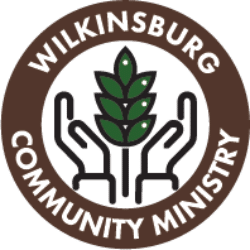
Wilkinsburg Community Ministry
We Share Food with residents of Wilkinsburg and adjacent neighborhoods of East Homewood, East Liberty, Park Place, Regent Square, Swissvale, Braddock, Edgewood, Forest Hills, and areas of Penn Hills.



We offer our neighbors a diversified and, we hope, sustainable, source of fresh food in addition to a variety of processed foods provided by the Greater Pittsburgh Community Food Bank.
A Brief History of Food Banks
Since the 1950s, community food banks and their network of pantries are designed around an emergency model to provide food in such one-off circumstances as natural disasters (hurricane, flood), military disasters (9/11), and economic/medical disasters (pandemic).
Initially, these were considered short-term responses, not the long-term solutions that they have become, and certainly not the life-long crises that our neighbors in Wilkinsburg, Homewood, Edgewood, and Swissvale face due to the income disparity endemic in our region. With fresh food provided by local gardeners and relationships with the Greater Pittsburgh Community Food Bank, 412 Food Rescue, Trader Joe’s, Market District, and Whole Foods, we anticipate a more balanced source of foods.
Wilkiinsburg Community Ministry We Share Food philosophy.
We Share Food with over 5,000 neighbors per month, including senior citizens, citizens with disabilities, at-risk youth, and families who are economically challenged, underemployed, or facing emergency situations. Our philosophy offers our neighbors choice and dignity. A 2017-18 study, funded by the Forbes Funds, identified the principal problem WCM faced: many of the programs we had started had developed into self-sustaining projects, but the greatest challenge in Wilkinsburg remained food insecurity. WCM’s leadership understood that true sustainability lay not simply in acquiring more food, but in fostering long-term stability for Wilkinsburg and Wilkinsburg residents, indeed, for the entire East End community. This holistic approach formed the basis of reorganization in 2019, when WCM handed off the children’s food program to a nonprofit specializing in kids’ food. In the future, WCM would focus on the best practices in food pantry operations based in choice and dignity.
Wilkinsburg’s challenges are well-publicized. In the past sixty years, the community has seen a decline in population, income, and the departure of businesses. Wilkinsburg residents – current and former – continue to work to revitalize their borough, rejuvenate the education system, and solve the problems associated with poverty. By 2020, the contents of our pantry, including dry foods, canned goods, and frozen foods, could be combined into a different meal every day: a total of over 365 meal combinations, depending on what our neighbors chose to eat. Their choices were a foundation element of empowerment in nutrition and life. WCM focused more on a model of food sharing that encouraged people to “shop” for food, taking what they would eat, and leaving what they would not.
A key part of this rethinking involved changing how we, as staff and volunteers, thought about the people who use our services. Instead of seeing clients, we see neighbors. Instead of handing out food, WCM shares food. This fundamental change in our vocabulary helped us see our neighbors—and they us—as connected in a common goal. This is the first pillar: rethinking our relationship with our neighbors as a joint enterprise.
A second pillar of the We Share Food study engaged WCM with other food and nutrition organizations. WCM partnered with several local grocery stores to accept produce, meats, and canned goods that the stores could not use. In 2022, the partnership with 412 Food Rescue brought WCM a regular supply of “rescued” food from Giant Eagle, Market District, Trader Joe’s, and Whole Foods, plus several corner stores, bakeries, and food cooperatives. Partnerships with local farmers, Grow Pittsburgh, and several farm markets expanded WCMM’s supply of fresh vegetables, and, in the winter, we budgeted enough to purchase fresh fruits and veggies from a local wholesaler.
The outcomes of our programs include reducing hunger in Wilkinsburg, supporting the health and well-being of our senior citizen neighbors, helping economically-challenged families have basic necessities, and keeping Wilkinsburg streets safer through partnerships with educational and after-school youth programs. We welcome you to learn more about our Food Sharing program. We urge you to get involved in the Wilkinsburg community by volunteering and/or making a donation at our Give Lively page.
